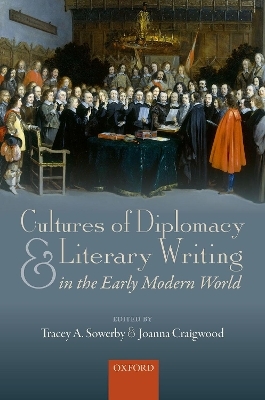
Cultures of Diplomacy and Literary Writing in the Early Modern World
Oxford University Press (Verlag)
978-0-19-883569-1 (ISBN)
This interdisciplinary volume explores core emerging themes in the study of early modern literary-diplomatic relations, developing essential methods of analysis and theoretical approaches that will shape future research in the field. Contributions focus on three intimately related areas: the impact of diplomatic protocol on literary production; the role of texts in diplomatic practice, particularly those that operated as 'textual ambassadors'; and the impact of changes in the literary sphere on diplomatic culture. The literary sphere held such a central place because it gave diplomats the tools to negotiate the pervasive ambiguities of diplomacy; simultaneously literary depictions of diplomacy and international law provided genre-shaped places for cultural reflection on the rapidly changing and expanding diplomatic sphere.
Translations exemplify the potential of literary texts both to provoke competition and to promote cultural convergence between political communities, revealing the existence of diplomatic third spaces in which ritual, symbolic, or written conventions and semantics converged despite particular oppositions and differences. The increasing public consumption of diplomatic material in Europe illuminates diplomatic and literary communities, and exposes the translocal, as well as the transnational, geographies of literary-diplomatic exchanges. Diplomatic texts possessed symbolic capital. They were produced, archived, and even redeployed in creative tension with the social and ceremonial worlds that produced them. Appreciating the generic conventions of specific types of diplomatic texts can radically reshape our interpretation of diplomatic encounters, just as exploring the afterlives of diplomatic records can transform our appreciation of the histories and literatures they inspired.
Tracey A. Sowerby (University of Oxford) researches early modern political culture and religion, with a particular focus on diplomatic practices and cultures. She was PI on two diplomacy-related projects 'Textual Ambassadors: Cultures of Diplomacy and Literary Writing in the Early Modern World', funded by the AHRC and 'Centres of Diplomacy, Centres of Culture' funded by the British Academy. She is the author of Renaissance and Reform in Tudor England: the Careers of Sir Richard Morison c.1513-1556 (Oxford, 2010) and is co-editor, with Jan Hennings, of Practices of Diplomacy in the Early Modern World c. 1410-1800 (London, 2017). Joanna Craigwood (University of Cambridge) works on the relationship between English literature and diplomacy in the sixteenth and seventeenth centuries. She has published variously on the diplomatic contexts for literary theory, Sidney and Shakespeare, and on diplomats as book collectors. She was co-investigator on the AHRC-funded international network 'Textual Ambassadors: Cultures of Diplomacy and Literary Writing in the Early Modern World' and has given invited talks on literature and diplomacy across Europe and the US. She has worked as a lecturer in English at Sidney Sussex College, Cambridge and an affiliated lecturer at the Faculty of English, University of Cambridge.
Tracey A. Sowerby and Joanna Craigwood: Introduction: Literary and Diplomatic Cultures in the Early Modern World
Part I. Literary Engagements
1: Joanna Craigwood: The Place of the Literary in European Diplomacy: Origin Myths in Ambassadorial Handbooks
2: Timothy Hampton: Distinguished Visitors: Literary Genre and Diplomatic Space in Shakespeare, Calderón, and Proust
3: Mark Netzloff: Lines of Amity: The Law of Nations: in the Americas
4: John Watkins: Diplomatic Pathos: Sidney's Brazen Fictions and the Troubled Origins of International Law
Part II. Translation
5: José María Pérez Fernández: Translation and Communication: War and Peace by Other Means
6: Catarina Fouto: The Politics of Translation: the Lusiads and European Diplomacy (1580-1664)
7: Peter Auger: Translation and Cultural Convergence in Late Sixteenth-century Scotland and Huguenot France
Part III. Dissemination
8: Joad Raymond: Books as Diplomatic Agents: Milton in Sweden
9: András Kiséry: Diplomatic Knowledge on Display: Foreign Affairs in the Early Modern English Public Sphere
10: Fabio Antonini: A Diplomatic Narrative in the Archive: The War of Cyprus, Record Keeping Practices and Historical Research in the Early Modern Venetian Chancery
Part IV. Diplomatic Documents
11: Jan Hennings: Textual Ambassadors and Ambassadorial Texts: Literary Representation and Diplomatic Practice in George Turberville's and Thomas Randolph's Accounts of Russia (1568-9)
12: Christine Vogel: Diplomatic Writing as Aristocratic Self-fashioning: French Ambassadors in Constantinople
13: Tracey A. Sowerby: Negotiating with the Material Text: Royal Correspondence between England and the Wider World
14: André Krischer: Ritual Practice and Textual Representations: The Free Imperial Cities in the Society of Princes
| Erscheinungsdatum | 06.08.2019 |
|---|---|
| Zusatzinfo | 9 Illustrations |
| Verlagsort | Oxford |
| Sprache | englisch |
| Maße | 161 x 241 mm |
| Gewicht | 648 g |
| Themenwelt | Geschichte ► Allgemeine Geschichte ► Neuzeit (bis 1918) |
| Geschichte ► Teilgebiete der Geschichte ► Kulturgeschichte | |
| Geisteswissenschaften ► Sprach- / Literaturwissenschaft ► Anglistik / Amerikanistik | |
| Geisteswissenschaften ► Sprach- / Literaturwissenschaft ► Literaturwissenschaft | |
| Sozialwissenschaften ► Politik / Verwaltung ► Staat / Verwaltung | |
| ISBN-10 | 0-19-883569-8 / 0198835698 |
| ISBN-13 | 978-0-19-883569-1 / 9780198835691 |
| Zustand | Neuware |
| Haben Sie eine Frage zum Produkt? |
aus dem Bereich


